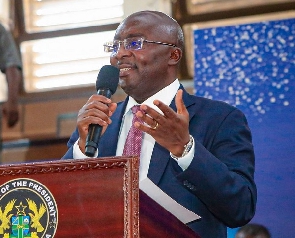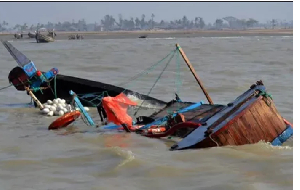Vice President, Dr. Mahamudu Bawumia has indicated that the country makes an annual revenue loss of $100 million through corrupt practices at the various Ports in the country.
According to the Vice President, the Ghana Revenue Authority (GRA) estimates a monthly loss of more than $8.3 million which amounts to almost $50 million every six months.
“These losses are due in part to the deception by some importers who deliberately and wrongly declare contents of imported containers with the aid of some Port officials”, he observed.
In a speech read on his behalf by the Minister for Public Enterprises, Joseph Cudjoe, at the opening of the Regional Maritime Sector Stakeholder Workshop on Global good practices in vessel clearance on Thursday, January 19, 2023, in Accra, Dr. Bawumia noted that corruption is a major obstacle to sustainable development in any nation since it leads to weak institutions and create injustice and insecurity.
“I cannot stress enough the effects of corruption on a country and why it must be discouraged among its citizenry”, he added. The Vice President pointed out that, the Maritime Industry is exposed to the risk of many forms of corruption, particularly with respect to the multi-layered interface with Ports saying “corrupt demands, including unlawful requests for payments to allow ships to enter and depart the port or disproportionate penalties being applied for minor errors can lead to interruptions to normal operations, a risk to personal and ship safety, ships being delayed and or put off-hire and hence incurring higher operational costs”.
Dr. Bawumia declared that Ghana’s two main Ports which are the Ports of Tema and Takoradi play vital roles in the socio-economic development of the nation as does the Ports of Darkar, Mombasa and Cotonou, thus governments should consider the operations of their Ports as very important economic activity.
“Ghana in an attempt to lessen corruption at the Port, initiated the Paperless Port System (PPS) in September of 2017. The system is designed to ensure an efficient and expeditious discharge and clearing of goods for all involved in the clearing chain in Ghana’s Ports. It also allows for the import process flow to be done online and captures relevant Import information on a database”, he pointed out.
The Vice President further observed that there is a compelling need for the Maritime Sector to formalize actions to combat bribery and corruption by collaborating and encouraging all stakeholders in the ship/shore interface to ensure compliance with National and international laws prohibiting bribery and corruption. He urged all countries and stakeholders present at the workshop to work against corrupt practices by constantly focusing on establishing corruption measures and or improving them when these measures exist already.
“It is therefore the responsibility of all Governments to take every action to mitigate corruption and in this case, within the Maritime industry”, he said.
The two-day regional conference is being organised by the Maritime Anti-Corruption Network (MACN) and CBI Nigeria, in Ghana for the maritime sector to promote the public-private sector and inter-industry dialogue on tackling corruption in seaports.
The conference is expected to facilitate good practice-sharing sessions with government and private sector stakeholders across the region. The conference aims to be a stepping stone in designing projects in the participating countries to improve the business operating environment in the maritime industry through specific activities and wider port sector programs on integrity building and anti-corruption.
AM/KPE
Business News of Friday, 20 January 2023
Source: www.ghanaweb.com













